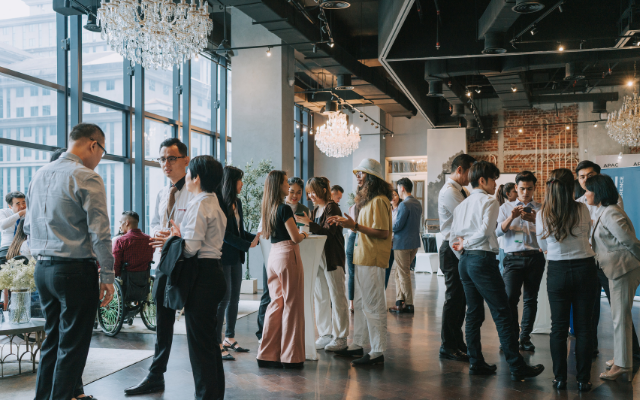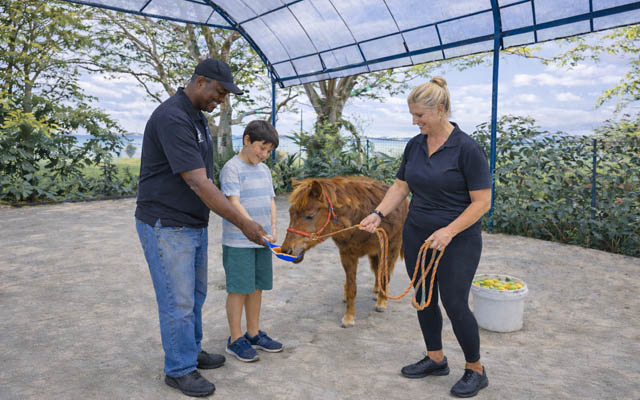On the brand’s 30th anniversary, Lee Lin, Nobu’s regional director of Asia-Pacific, talks about growing up in hotels, Nobu’s brand of lifestyle, and pivotal partnerships to restore iconic heritage buildings on two sides of the world
 Tell us more about your background in hospitality.
Tell us more about your background in hospitality.
The fact that my father was general manager of the Evergreen Hotel Bangkok and went on to manage other hotels meant that we stayed in many beautiful hotels growing up. The beautiful luxury hotel designs – along with the fact that I come from a very artistic family – led me to study architecture at Notre Dame.
I eventually joined Blink Design Group in Bangkok, which gave me a chance to focus on design from a user’s and developer’s perspective. Later, at Asset World Corporation (AWC), I managed luxury hotel and resort projects, blending design and development experience. It was also during my role as managing director that I brought Nobu in as a partner for AWC. I joined Nobu in September 2023 – now working with Nobu, a hotel brand, I can truly say my journey has come full circle.
Let’s talk about Nobu’s approach to lifestyle. How does Nobu define a lifestyle hotel?
As a hotel, we’re only 10 years old – and our core values and philosophies were born out of the story of Nobizawa. Since the beginning, we have been rooted in the concept of kokoro, which is the connection between emotions, feelings, spirit and soul. So, everything we do is from the heart. This has always been the heartbeat of Nobu restaurants and since its branching out to hotels and residences.
What do you perceive are some key factors behind Nobu’s success in the non-traditional approach of branching from restaurants to hotels, and how does it differentiate the brand from traditional luxury hotels?
We have an upside-down business model, so our F&B is the heartbeat of the hotel – and to have an F&B that works in a hotel, it almost never (happens). You don’t have that. Most of the hotels, F&B either suffers, or barely breaks even, or it’s outsourced.
Many brands are now just starting to look into F&B strategies, which is almost like retrofitting a property – it doesn’t really work. F&B needs to be seamlessly embedded into the whole experience. At Nobu hotels, we actually do put F&B first; everything else follows beautifully and quite naturally from our heart, which is the Nobu restaurant.
Most of our restaurants perform as well as the rooms in terms of revenue – most hotels nowadays struggle with keeping their restaurants open.
At some of our properties, each restaurant seat brings in as many as the number of rooms per year. For example, let’s say you have a 100-seat restaurant and 200-key hotel, so it’s almost like having a 300-key hotel without spending the money to build a 300-key hotel.
It is a model that really works. It makes a lot of sense because it’s just like the original hotel concept where people go there to eat and sleep and meet.
So in a way, we are innovators, but in another way, it’s just going back to the basics. I think people forgot about how important F&B is for a hotel – not just from a profitability standpoint, but from a sustainability standpoint.
You seem to have a big partnership focus as an executive. Can you tell how that has been useful at Nobu?
Nobu is one brand – we’re one brand so we’re always as good as the next project. For us, we’re quite selective of who we work with. Those who we want to work with are usually owners that have a lot of passion in what they do, so from the onset, we establish that trust, then that gets carried through. That is very important for us.
In seeking partners, we focus on creating a memorable experience and prioritise potential partners who “touch and feel” the brand through visits, so that they can understand our core values. This approach builds trust and long-term relationships. Unlike traditional hotel chains with strict requirements, Nobu values a good fit over property size. This strategy creates a network of repeat partners who own multiple Nobu properties across different locations.
We also rely on owners to help us localise. One of our priorities is to buy-in from the local market, because in a world of uncertain geopolitics, that’s the most sustainable source market. Our partners really cherish and are deeply invested in their properties, and Nobu as a brand.
As regional director of Asia-Pacific, can you highlight the current trajectory and direction of Nobu’s development in Asia-Pacific and South-east Asia? What are some of the highlights to come, and where do you see the most growth potential?
Danang is our first development in Vietnam, and we also have Ho Chi Minh City (same partner). We always look at potential locations as a place where our F&B would thrive. We’ve grown very well in Europe – where we have six hotels in Spain, the US, and the Middle East. Asia is our next growth pocket, (such as) Taiwan, South Korea, Japan, Indonesia and the Philippines; the Maldives would (also) be an amazing resort for us.
Half our new projects also have branded residences.
The Plaza Athénée Bangkok will be a collaboration between the Plaza Athénée brand and Nobu Hotels. There will be two distinct properties: a Plaza Athénée on the riverfront and a Nobu hotel diagonal to it, behind the Mandarin Oriental Bangkok. This project is a perfect marriage of East and West, with Plaza Athénée’s heritage and Nobu’s modern luxury.
To be able to craft two properties in two iconic cities, and with renowned designers working with us to do these two properties – it doesn’t get sweeter than this. I’m very lucky to have envisioned this deal together with AWC’s CEO and president Wallapa Traisorat and to be able to sign these two deals and work on this project on both sides, continuing with Nobu.
The trust from partners like AWC adds pressure, but also immense excitement for Nobu to create something iconic.


















